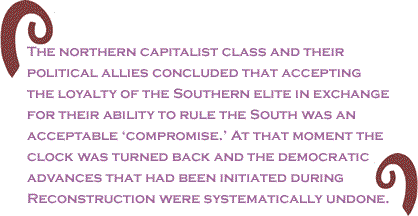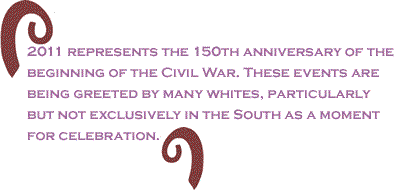Over
the last two decades increased attention has focused on
the ramifications of failing to complete an anti-biotics
regimen in treating infections.��The most noteworthy example
of the problem involves tuberculosis.�Many patients begin
their treatment and then decide at a certain moment to stop
because they believe that they have been �cured.�� The net
result of this action is that not only is the infection
not eliminated but a stronger, more drug resistant variant
of the infection is often produced.� Needless to say this
can have catastrophic consequences.
2010 marked the 150th anniversary of the initial secession
of states from the United States of America that resulted
in the formation of the Confederate States of America.�
2011 represents the 150th anniversary of the beginning of
the Civil War.� These events are being greeted by many whites,
particularly but not exclusively in the South as a moment
for celebration.

The fixation on the Confederacy by white reactionaries has
always been a bit curious.� The formation of the Confederacy
was an act of treason.� There is no ambiguity about this.�
They were repudiating the U.S. Constitution and moving to
separate.� Yet many of the proponents of a pro-Confederate
stance, or at least critically supportive views of the CSA,
are themselves the ones who are (and have been) among the
first to throw around the term �treason� when referring
to progressives who criticize US foreign policy.
Yet the renewed and often sympathetic attention to the CSA
is not simply curious and hypocritical but speaks to the
fact that the Civil War and its tasks were never completed.�
It is this point that African Americans and other progressives
need to underscore.� There is a renewed battle underway
over how to interpret the Civil War, the reasons for it
occurring and the nature of the CSA regime.� This battle
cannot be ignored.
To understand what is taking place before our eyes we must
recognize that the Civil War was not from 1861-5.� It actually
encompasses the period from 1859 (with John Brown�s attack
on the arsenal at Harper�s Ferry, with the intent of sparking
an African slave insurrection) through 1877 (with the final
withdrawal of Federal troops from the South and the end
of Reconstruction).� It was not just a series of deadly
military battles but an entire period where the future was
up for grabs.� While it is absolutely true that the secession
had its roots in a struggle over free trade (which the South
wanted) and states� rights, the principal source of the
conflict was situated in the system of slavery.� The attempts
by past and current CSA sympathizers to soft-pedal this
are completely disingenuous.� Not only are there documented
speeches and writings by CSA leaders as to the centrality
of slavery in their treason but there also is the obvious
point that if slavery were not really in question, the CSA
would have freed the slaves themselves, as they desperately
needed troops.

The period from 1865-1877 came to be known as Reconstruction,
during which time significant efforts were undertaken in
the South to achieve both Black power and power for the
poor.� This was the period that many historians refer to
as the attempt to correct the misdeeds and white supremacist
character of the U.S. Constitution.� Yet the northern capitalist
class, victors in 1865 over the Southern plantocracy, was
from the very beginning ambivalent about the scope of the
democratic experiment they were prepared to undertake.�
To have completed the tasks of the Civil War would have
meant a full expropriation of the Southern plantocracy,
land redistribution in favor of the African former slaves
and poor whites, and would actually have called into question
Federal policy towards the Native Americans and Mexicans
in the Southwest.� In other words, to have actively supported
the democratic thrust of Reconstruction would, more than
likely, have called into question much of the framework
of the United States of America.
Despite the valiant efforts of the so-called Radical Republicans
in Congress, and the courageous efforts by the freed Africans
and their allies, a �counter-revolution of property�
(as W. E. B. Dubois coined it) took place through the direct
introduction of white supremacist terrorism and the disenfranchisement
of the freed African, and ultimately of many poor whites
as well.�The Ku Klux Klan was only one of several white
terrorist organizations that emerged during this time.�Ultimately
the northern capitalist class and their political allies
concluded that accepting the loyalty of the Southern elite
in exchange for their ability to rule the South was an acceptable
�compromise.� �At that moment the clock was turned back
and the democratic advances that had been initiated during
Reconstruction were systematically undone.
The destruction of Reconstruction was accompanied by what
we today would call �spin.�� There was a rewrite of what
had actually taken place in order to justify the white terrorist
takeover (including through armed coups) of the political
reigns in the South.� The northern ruling elite was complicit
in this rewrite.� The production of films such as the notorious
yet historic 1915 Birth of a Nation was only
one of many examples of a complete distortion of the democratic
revolution of Reconstruction.� It was a desire to address
this revision of history that led Dubois to write his path
breaking work Black
reconstruction in America in the 1930s.� This book remains a must-read for
anyone trying to understand not only Reconstruction but
white supremacy in the USA.
in the 1930s.� This book remains a must-read for
anyone trying to understand not only Reconstruction but
white supremacy in the USA.

The fact that there are states that fly the Confederate flag,
and political leaders who excuse the treason of the CSA
should not take anyone by surprise.� Though the CSA was
soundly defeated on the battlefield, the reactionary essence
of the CSA was itself not defeated.� Reconstruction was
the project that could have rooted out much of the white
supremacist system, but that was not meant to be.� White
supremacy was not only useful in preserving the slave system�which
was defeated in 1865�but also useful as a means of social
control over people of color and poor whites as US capitalism
moved from a largely agricultural and merchant base, to
an industrial and financial base.� In that sense what was
operative was not the cowardice of the northern elite but
rather their recognition that white supremacy needed to
be reorganized, rather than eliminated, and that the Southern
elite would be useful to the extent to which they accepted
a subordinate position to them.
As a result the USA has been unable to come to terms with
pivotal moments and actions in history where race is involved
such as how to evaluate John Brown and the raid on Harper�s
Ferry or the actual role of slavery as the principal cause
of the Civil War.� These issues, among others, continue
to emerge because they were not challenged and decisively
answered from the very beginning.� Instead ambiguity was
allowed to reign and with it a more fortified, occasionally
subtle and always toxic white supremacist narrative and
practice.

The debate over the CSA, then, is actually a debate about
the future of the USA.� While there are white supremacists
who call for a new secession and the creation of an openly
white republic, the significance of the gloss on the CSA
is not to be found there.� Rather, it is to be found in
the fixation on the proto-fascist vision that was the Confederate
States of America, a vision that entertains the part of
white America that so desperately seeks a mythical route
back to a secure racial identity as protection against the
dramatic economic, political and social changes underway
domestically and globally.� To borrow from the author Howard
Fast in his novel Freedom
Road (American History Through Literature) ,
they wish for their uniform�their white skin�to actually
amount to something in the 21st century. ,
they wish for their uniform�their white skin�to actually
amount to something in the 21st century.
BlackCommentator.com Editorial Board member, Bill Fletcher, Jr., is a Senior Scholar with
the Institute for
Policy Studies, the immediate past president ofTransAfricaForum and co-author of, Solidarity Divided: The Crisis in Organized Labor and a New Path
toward Social Justice (University of California Press), which examines
the crisis of organized labor in the USA. Click here to contact Mr. Fletcher.
|

